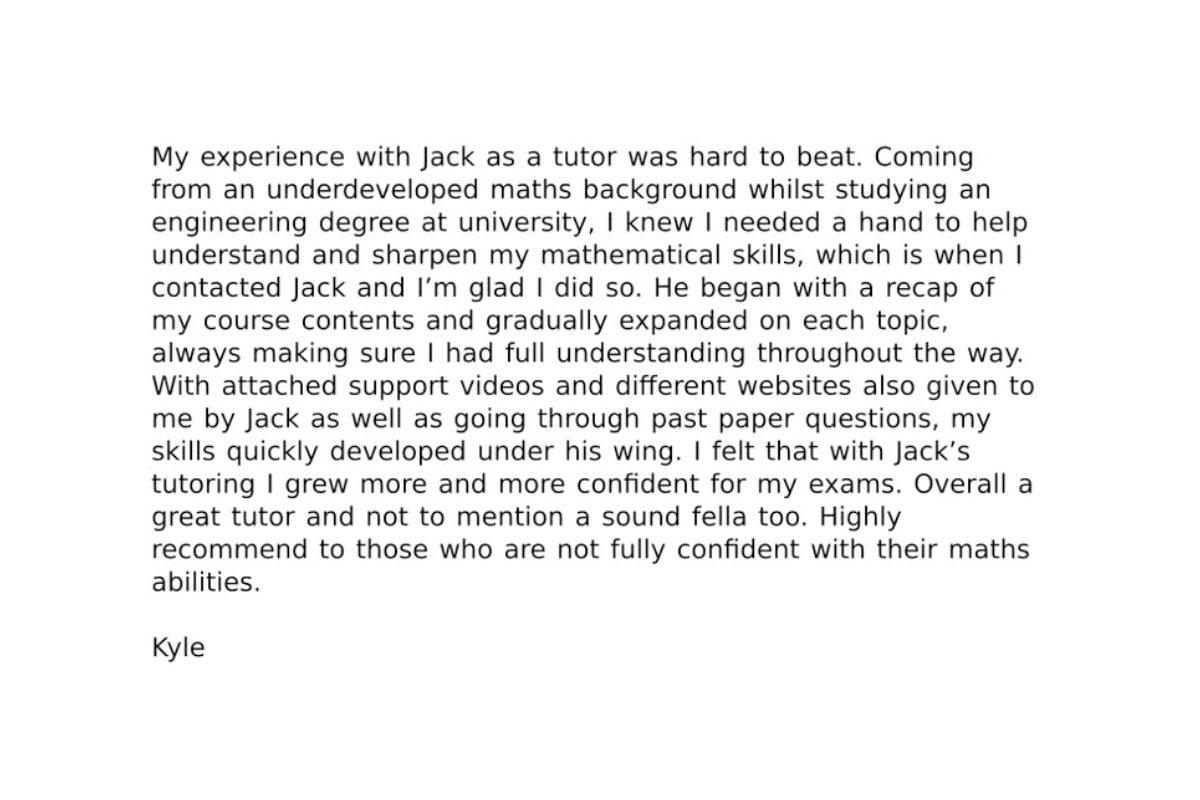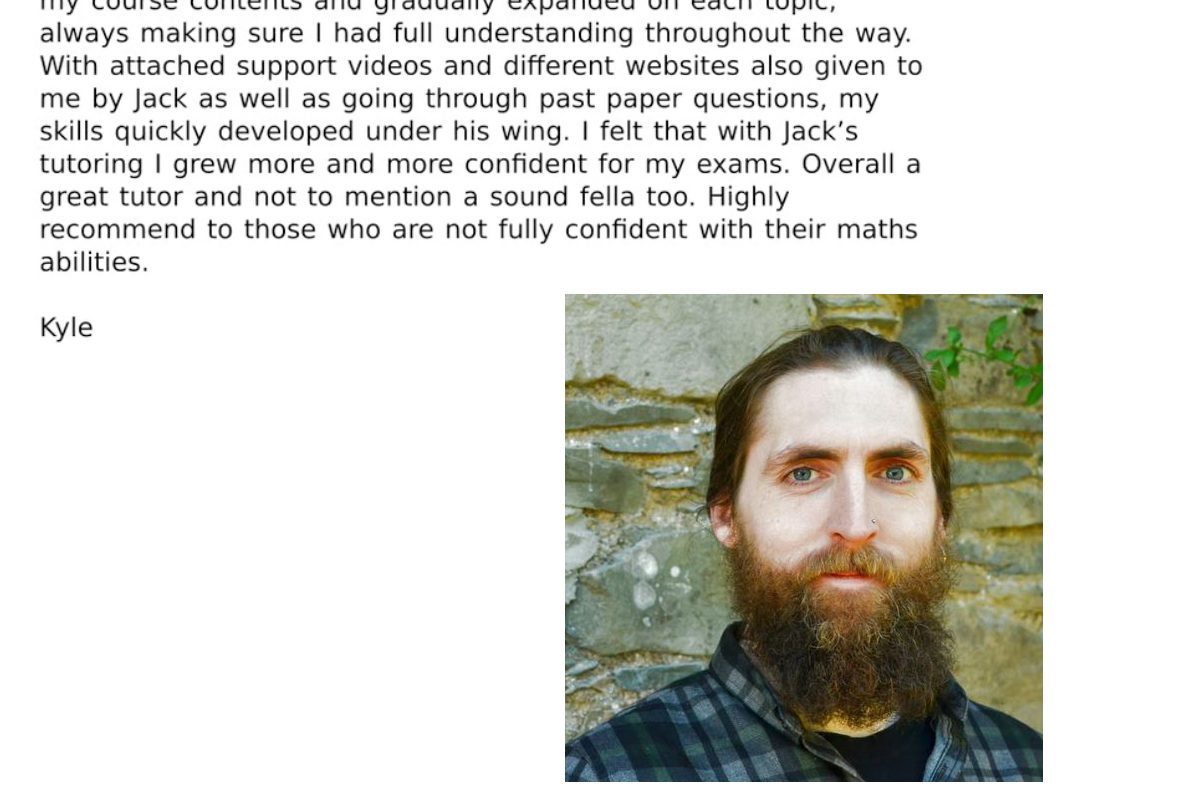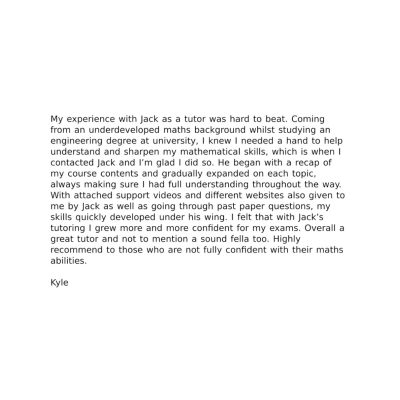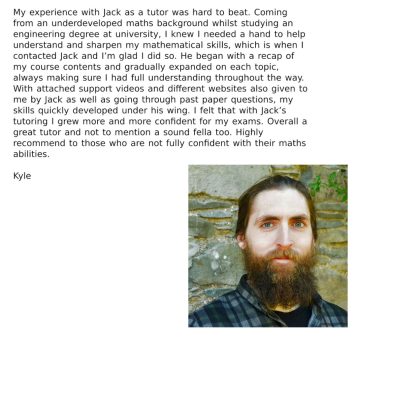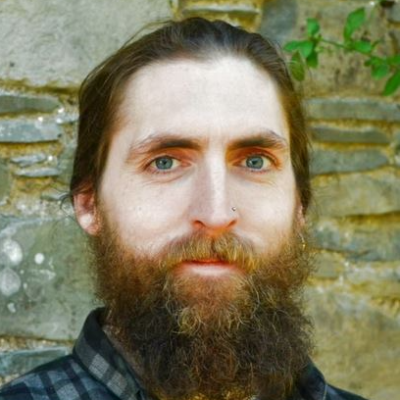

Jack J
Maths tutor, physics tutor, and science tutor in Belfast. GCSE and A level.
£30.00/hr
- 0.0 /5.0 (00)
- 55%Profile completion
Languages I know
- English
A brief introduction
Do you want a deep understanding that allows you to fully answer any maths and science questions?
jackreidtutor@gmail.com
Read on to find out how I can help you or your child achieve this. Please also view the images on this ad for testimonials, and click on the ‘video’ button to see my youtube channel.
Subjects I can tutor:
-GCSE
–Maths (all levels, including Additional Maths)
–Science (all levels, including Physics, Chemistry and Biology)
-A level
–Maths
–Further maths
–Physics
I should be able to travel to your home if it’s in or near Belfast.
I am a friendly, patient tutor, with nine years of experience helping students with their mathematics and science. My qualification is Physics and Philosophy MSci 1st class honors from Bristol University, during which I conducted a research project under one of the founders of quantum information theory, Sandu Popescu, and made a contribution to the theory of quantum thermal machines. This means I have a full understanding of Maths and Physics at GCSE and A levels. More importantly, I have a love of the subjects which I enjoy sharing.
I was also part of the community that founded a cooperative microbrewery. I taught myself brewing and left the brewery after five years as head brewer, having trained new staff. This reflects the vital ability to autonomously learn and propagate diverse skills in response to different situations, which I try to impart to my students.
The following is about maths -but these strategies can be used to learn almost anything.
Often students are struggling with maths because it’s taught at the same pace for everyone. This makes sense when the teacher’s role is to deliver lessons to an entire class. But students develop understanding at different rates. For example, I did well in maths at primary school, but poorly for the next three years. Our class had inexperienced teachers who weren’t able to meet my needs. From GCSEs onward I had excellent teachers and classmates. I.e. a student who is capable of achieving a top degree and contributing to theoretical physics could do poorly in school if the environment is not conducive for their learning.
My approach is flexible to the needs of the student and may be different from the school experience. I enquire as to the problems the student is working on, and from there try to offer the student a role model of how to solve those problems. Over the years I have solved many, many problems, and I am good at explaining my thought processes. Through exposure to such problem solving the student may internalize it and increase their ability to solve problems independently. The teacher may be less able to act as a role model for the processes the student should be doing. I.e. the student is not expected to internalize the process of giving lessons to 15-30 people. If this perspective seems unusual consider the question that if the school system met every student’s needs, would one-to-one tuition exist?
This process I try to model is:
1) select a mathematical problem.
2) try to solve the problem using only the present contents of consciousness. This step is crucial, yet often skipped for fear of appearing foolish by saying or writing something incorrect. But the effort of trying to solve a problem with what is already indigenous to the mind means that the correct method, since we have been seeking it for some time, will be highly psychologically salient, and therefore far more likely to be retained than if it were simply looked at in the first place.
3) if this fails seek further tools, such as in-class notes, the internet, from other people, etc.
4) if no solution is forthcoming, as sometimes happens, sleep on the problem. During sleep somehow the subconscious can conspire to find a solution when the conscious mind has been occupied with it for some time.
5) if after several days the problem remains unsolved, seek a more experienced expert.
My first aim in establishing this is to listen to what the person I’m teaching is saying and try to understand their perspective on the problem. The better a picture I have of how someone conceptualizes a problem, the more able I am to show them how to extend their knowledge and abilities.
My second aim with any student is to build confidence at the stages underlying the current topics; this is a delicate process as students can feel a stigma returning to earlier work, but once the fundamental concepts and techniques are clear and well exercised more difficult techniques fall easily into place. E.g. it is difficult to solve questions about the volume of solids if you don’t have a clear physical picture of what ‘volume’ is.
“It is not that I’m so smart. But I stay with the questions much longer.”
Albert Einstein
My third aim is to cultivate a healthy attitude to mistakes.
Many of us seem to have a discomfort with revealing ignorance, or admitting it to ourselves. Many students are cautious and afraid to express their own thoughts because they are scared these will be wrong. And if when they are expressed they do turn out to be wrong the student feels they’ve failed, when actually they could be feeling that they are one step closer.
It may be easier for a 16-year-old to say, “I’m no good at maths” than it is to sit for an hour trying, and failing, to solve some quadratic equations. In the first instance, one is exposed to one’s ignorance for a second, in the latter one lives with it for an hour.
But science finds that making many attempts at a problem is the better strategy for solving it. Any mistake is a lesson, it narrows down the options that could lead to a solution. Every great scientific discovery was the result of many fruitless hours, frustrations, and dead-end attempts.
My fourth aim is to encourage the student to explain things back to me and become confident enough to explain it to others. There is an aphorism that we don’t really understand something until we can teach it. I.e. teaching itself is a late stage of the learning process – it causes us to bring our assumptions to light, to put things in a way that is not just privately clear to us, inside our own heads, but is clear to our contemporaries. I have many times seen a student go from disliking a subject to being able to explain it to their classmates. Indeed one way you could help is by asking your son/daughter to explain something to you!
“I cannot teach anybody anything. I can only make them think”
Socrates
My fifth aim is to encourage critical thinking – a foundational skill of the mind. With critical thinking the student can always expand their own knowledge base, realize their own mistakes and biases, and those of others. This is what allows a student to improvise a solution to an unseen problem, as may be needed on an exam.
“Education is not the filling of a pail, but the lighting of a fire.”
William Butler Yeats
My sixth aim is to encourage self-directed, autonomous learning. Many students I have met have not realized that the answers to their questions can be found outside of class materials – on Youtube, Tiktok, or Instagram, on apps such as Khan Academy, on exam board websites, in library books etc. If a tiny spark finds the right kindling there is no stopping the blaze; if a small amount of agency can be fostered in the student they can transform themselves. The more questions students can learn to ask and answer for themselves then the more space they will have to ask harder, deeper questions of their teachers.
Exam pressure can contribute to low self-esteem and make learning more difficult. Rather than put pressure on my students to increase marks etc., I just work on building understanding and speed; there is usually enough pressure from the school and parents; in fact by offering a space without that pressure, where mathematics is enjoyed for its own sake as well, students usually start to enjoy it more. Happily, some effects of increased enjoyment of mathematics and increased mathematical self-confidence are getting more out of class and doing better in tests.
This said I also cover exam technique, specific to the board the student is being assessed by. In short this comes down to speed, time allotment, having a stab even if you know it’s not right, and knowing when to abandon a question and move on.
I do appreciate that there are some students who simply don’t enjoy mathematics and just want to pass their exams because employers and further courses require them. In these cases the above strategy will help make it bearable.
Ultimately the only person who can change an exam result is the person undergoing the exam. But I can guarantee to offer a role model of mathematical problem solving, which will enable the student to grow and begin to solve problems themselves.
Please contact me to learn more and arrange a time if you are interested.
Availability
| Mon | Tue | Wed | Thu | Fri | Sat | Sun | ||
|---|---|---|---|---|---|---|---|---|
| PRE 12PM | | | | | | | | |
| 12PM-5PM | | | | | | | | |
| AFTER 5PM | | | | | | | | |
Media gallery
Trending tutor directory of 2022
Its Free, Join today and start spreading knowledge with students out there
Explore related tutors
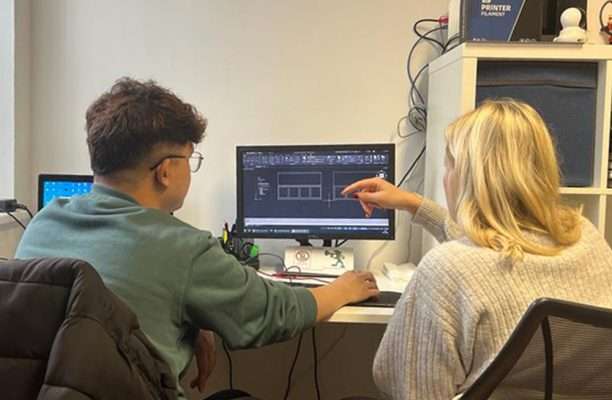 FEATURED
FEATURED
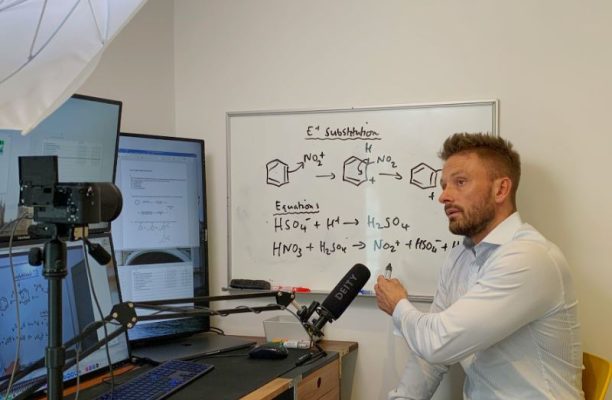 FEATURED
FEATURED
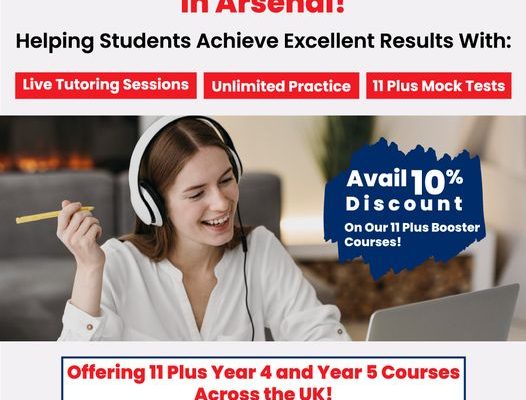 FEATURED
FEATURED
